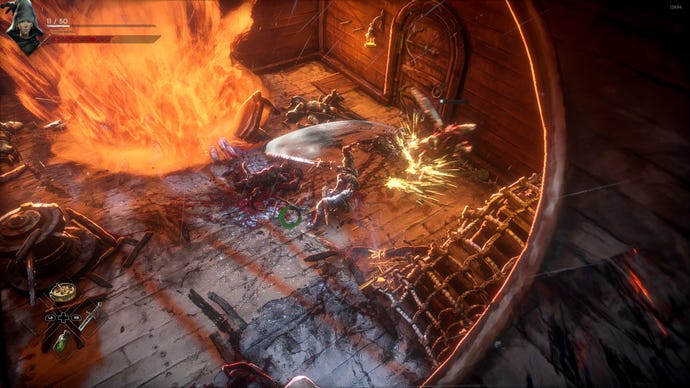Dark Souls would’ve been a better game in early access, says dev behind Dark Souls-like early access game No Rest For The Wicked
Head of Ori and the Blind Forest studio says there’s “just no way” they could’ve shipped the game without player feedback
Dark Souls, one of the most widely acclaimed video games of the last two decades - perhaps all time - and progenitor of one of modern video gaming’s most influential and oft-copied-rarely-bettered genres, the Soulslike, would’ve been a better game had it launched into early access. That’s the suggestion from the head of Ori and the Blind Forest developers Moon Studios in the wake of launching their own early access Soulslike, No Rest For The Wicked.
Thomas Mahler took to Xitter to extol the benefits of launching No Rest For The Wicked into early access after the Soulslike ARPG arrived last week with a number of performance issues, which are now being smoothed out via a series of patches.
“We're not even a week into Early Access and it's already pretty clear that going with EA is one of the best decisions we could've made,” Mahler wrote in a lengthy post. “There is just no way we could have ever shipped Wicked 1.0 without being able to see all the data we're seeing now and getting all the feedback from users. And I mean actual users, not a Focus Testing Group.”
That’s all well and good - after all, early access has become a very well established part of the modern video game launch cycle, with Mahler pointing out the use of the in-development offering by the likes of Hades 2 creators Supergiant Games and Baldur's Gate 3 makers Larian as a way of “allow[ing] developers to truly perfect a product over time”, particularly “as games become more and more complex and sophisticated”.
“Shipping games is always incredibly difficult and stressful and most of the time it means making quite drastic compromises, especially if your product is trying to accomplish something new,” the developer wrote. “And if you don't know that it's okay to bring in certain features and scope after the fact, you'll just end up cutting before you hit the market.”
What’s perhaps a little more divisive is Mahler’s specific suggestion that the original Dark Souls - again, a game that literally spawned an entire genre that bears its name (yes, internet pedants, I know Demon’s Souls technically came first, but Dark certainly popularised it) - would’ve “benefited” from going through early access, had the concept existed back in the distant days of 2011.
“Imagine Dark Souls 1 would've been in Early Access - Instead of From [Software] rushing to ship a boxed product in a somewhat unfinished state, they probably would've been able to look at the second half of that game and still fully form and polish the less polished areas like Lost Izalith, etc.” Mahler said.
Now, it’s long-documented that parts of the first Dark Souls were the product of development time and budget running short - in particular the lava-strewn ruins of Lost Izalith, which are somewhat notorious for having repeated enemies, inconsistent design elements (such as a respawning Titanite Demon, the only such example in the entire game), one of the most frustrating bosses in the Bed of Chaos and notably barren environments. As such, they’re often assumed to be everyone’s least favourite part of the game and the objectively ‘worst’ area - though they may have a close competitor in the dark, poisonous Blighttown, especially in its original framerate-tanking form.
Still, I’d worry there’s a slippery slope in implying every big game could benefit from early access (to give due credit, Mahler only says “some games” would benefit) - especially a game like Dark Souls that deliberately revels in often cryptic and downright unforgiving game design. Elements of Dark Souls that have gone on to be considered some of its most iconic and influential - the constant autosaving, permanent NPC death, ruthless fixed difficulty, obtuse puzzles and secrets - could well have been ‘polished’ away by the process of mass group-testing and feedback from non-developers (obligatory acknowledgement of the irony of this article here). Those divisive elements can be hit-and-miss, sure, but they’re also the kind of risky decisions that can lead to games outside of the mould.

There’s certainly a good point to be made that Lost Izalith might’ve been even more memorable with more time and money to invest in the game, but would the process of early access have ended up sacrificing in other areas to achieve that? Would the absence of its notable rough patches have conversely made the level less memorable than its current state?
It’s all hypothetical, of course, and Mahler himself tackles the suggestion that a longer development cycle is the obvious solution - ie. studios simply having “the funds to finish the game and release it then” - by saying that’s viewing “a complex problem through a way too simple lens”.
The takeaway as always, then, seems to be that early access works for some developers - it certainly seems to be working for Moon Studios, as it did for Larian and Supergiant - but probably isn’t a one-stop-shop for anyone trying to make a game, as Larian’s director of publishing Michael Douse recently suggested.
Would it have worked for Dark Souls? We can only guess - and see if From Software ever take the leap onto the platform for something like Elden Ring 2.
Whether you agree or disagree with Mahler’s points on its hypothetical benefits for Dark Souls specifically, it’s hard to argue against his overall assessment that early access has enabled many more creators to work on games in a way that’s far more sustainable and is at least one way to tweak things to players’ desires in a way that traditional DLC and updates don’t always allow: “I'm confident that we will see games being created through Early Access programs that would've never been made without EA.”

